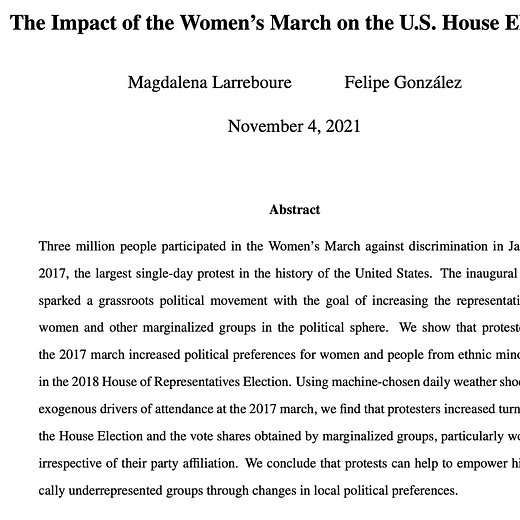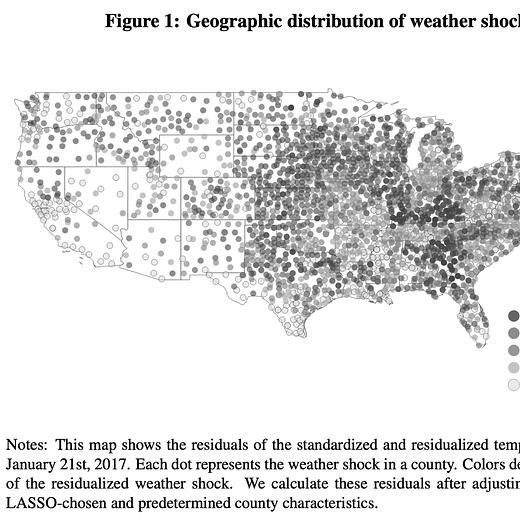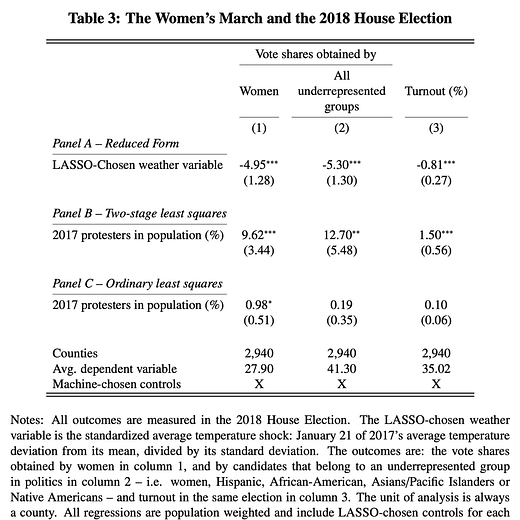Best of #econtwitter - Week of June 26, 2022 [1/2]
Jun 28, 2022
Welcome readers old and new to this week’s edition of Best of Econtwitter. Please submit suggestions — very much including your own work! — over email or on Twitter @just_economics.
This is part one of two.
Paper summaries

Michael E. Rose 🇺🇦@Michael_E_Rose
Q: What do 5,000 acknowledgements tell us about informal collaboration in financial economics?
A: A whole lot!
To find out, wait until Research Policy publishes issue 6 in July
OR: Get early view on authors.elsevier.com/a/1cquFB5ASINNO
OR: Read the 🧵
@mpi_inno_comp & @UCT_news

2:38 PM · Apr 8, 2021
12 Reposts · 53 Likes

Dean Eckles@deaneckles
Higher-income people pay higher markups, perhaps in part because they search less, consistent with diminishing elasticity of demand
kunalsangani.com/files/income_m…
Interesting to think about what this means for inequality, particularly in settings with posted, uniform prices

9:25 AM · Jun 21, 2022
5 Reposts · 26 Likes

Graham Mazeine@gmazeine
What we find, perhaps surprisingly, is that subjective job security has remained *remarkably stable* over the last 30 to 40 years in all three countries, once you account for the effect of the macroeconomic cycle (higher unemployment increases average insecurity). 6/N

2:27 PM · May 24, 2022

Omar Wasow@owasow
Working paper from @mlarreboure & @fagonza4 uses weather to approximate random assignment to participation in Women’s March. They find “protesters in 2017 increased political preferences for women and people from ethnic minorities in 2018 House Election.” mlarreboure.com/womenmarch.pdf



5:38 PM · Jun 24, 2022
20 Reposts · 49 Likes

matt@mpopv
This graph is wild. Stocks only grow during the night when the market is closed. They are almost totally flat over time if you only look at periods when the market is open deliverypdf.ssrn.com/delivery.php?I…

11:22 PM · Jun 23, 2022
64 Reposts · 706 Likes
^🤔🧐

Manasa Gopal@Manasa_23
Very excited my paper with @schnabl_econ is now forthcoming @RFS.
In this paper, we ask what happened to small businesses when bank lending declined during/after the financial crisis
academic.oup.com/rfs/advance-ar…
A short thread
(1/n)
academic.oup.com
Rise of Finance Companies and FinTech Lenders in Small Business Lending

1:10 AM · Jun 21, 2022
15 Reposts · 100 Likes

Massimo Anelli@massimo_anelli
We study the causal effect of #emigration on firm creation in sending countries combining admin data on emigration, firms and employment. Italy is (unfortunately) a great setting due to a sudden outflow of young and high-skilled Italians since the 2008 recession #econtwitter


AEA Journals @AEAjournals
Forthcoming in AEJ: Applied Economics: "Emigration and Entrepreneurial Drain" by Massimo Anelli, Gaetano Basso, Giuseppe Ippedico, and Giovanni Peri. https://t.co/xAkESaNqNt
7:47 PM · Jun 20, 2022
56 Reposts · 237 Likes

Michael Story ⚓@MWStory
Using ML to predict shootings in Chicago:
“…of the 500 people with the highest predicted risk, 13 percent are shot within 18 months”
nber.org/papers/w30170



10:51 AM · Jun 20, 2022
84 Reposts · 636 Likes
Interesting discussions

Ben Golub 🇺🇦@ben_golub
The thing I find myself most often asking of writers of economic theory is to make technical writing more skimmable. More valuable to a a reader with less time and attention than is ideal.
This has versions at the level of sentences, results, sections, and papers.
1/
7:28 AM · Jun 23, 2022
129 Reposts · 569 Likes

Ben Golub 🇺🇦@ben_golub
Especially for parts of the paper which are likely to be read nonlinearly, "reminders" are actually the first places people meet notation.
Reminders also help break up symbol-dense sentences and make them gentler.
Compare:
4/

7:44 AM · Jun 23, 2022
8 Reposts · 123 Likes

Ben Golub 🇺🇦@ben_golub
This leads to a broader point. Many authors seem to be writing for a reader who is like themselves: interested in a deep understanding of the problem. Perhaps a researcher interested in building on the results in the paper.
But this is not our marginal reader!
14/
8:43 AM · Jun 23, 2022
3 Reposts · 32 Likes
^could include every tweet from this thread

Yannai A. Gonczarowski@YannaiGonch
Many readers skim papers for theorems.Another way to help them is making theorems more self-contained by repeating crucial nonstandard parts of your model.
Instead of:
Thm 1. An equilibrium always exists.
Use:
Thm 1. If all buyers are eigenvalue-loving, an equilibrium exists.
1/3

Ben Golub 🇺🇦 @ben_golub
At the level of results, the plea for skimmability can be answered by supplementing formal and detailed statements with higher-level, intuitive, or otherwise complementary summaries.
5/
2:26 PM · Jun 23, 2022
4 Reposts · 30 Likes

Chris Blattman@cblatts
Like any profession, economics has a hidden curriculum—for how to succeed (plus how to help others succeed).
@marcfbellemare's new book pulls back the curtain.
A thread on some of my favorite advice and insights from the book.
mitpress.mit.edu/books/doing-ec…

4:07 PM · Jun 22, 2022
135 Reposts · 662 Likes

Josh Dean@josh_t_dean
This is interesting, because it feels like to me publication is a paper's funeral. The press has already been written, the flaws and strengths have been discussed ad nauseam, and finally you get to lay it to rest.

Chris Blattman @cblatts
5/ You are doing your research & career a disservice if you only aim for publications. Your article’s life begins at publication! Once your article is published, publicize it online, through op-eds, or media. That's how you shape the world, and also how you get citations.
6:04 PM · Jun 22, 2022
1 Repost · 25 Likes

Nageeb Ali@SNageebAli
Orthogonal to the location of ASSA 2023: are depts returning to in-person 1st round interviews? Why?
I found Zoom 1st rd interviews to be better -- more faculty attend + no hotel awkwardness + less travel.
Job talks are better in person but why not keep 1st round virtual?
7:55 PM · Jun 25, 2022
9 Reposts · 161 Likes
^some related US political stuff on what you might expect (content warning): here, here, here, here. US politics! Not recommended! Don’t click! Substack shows when you click 👀


